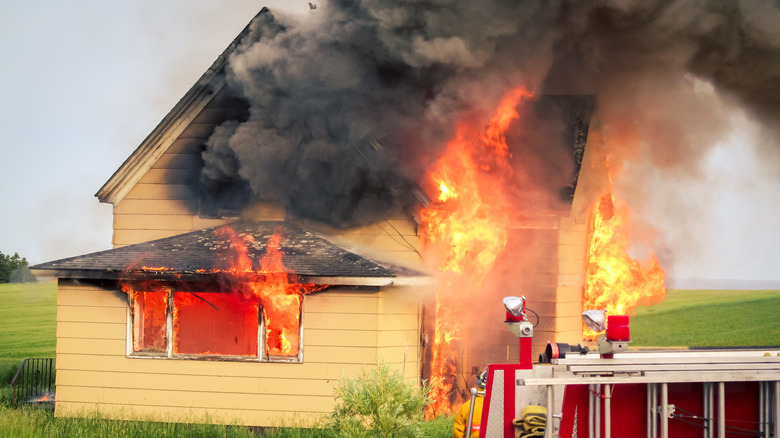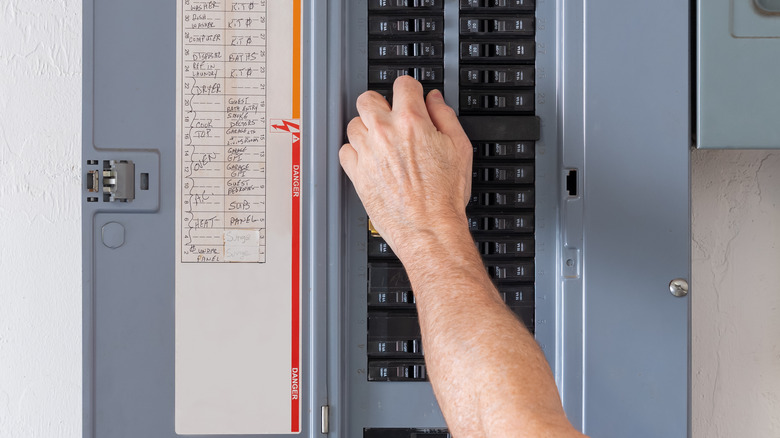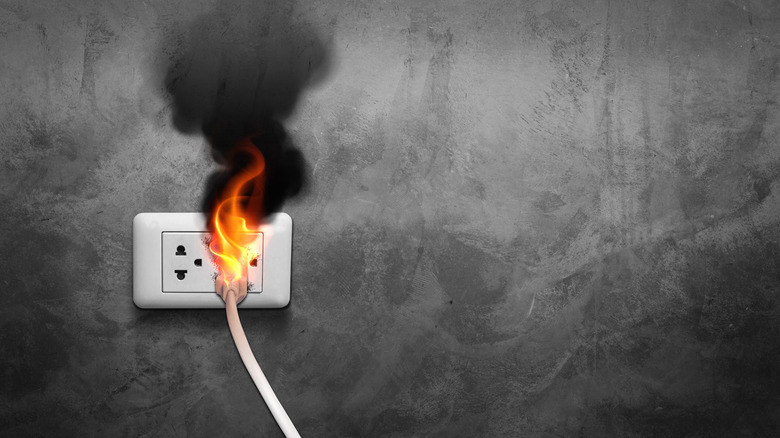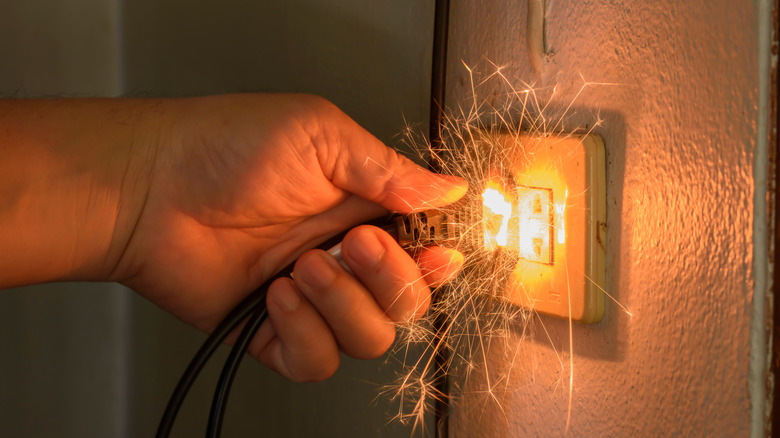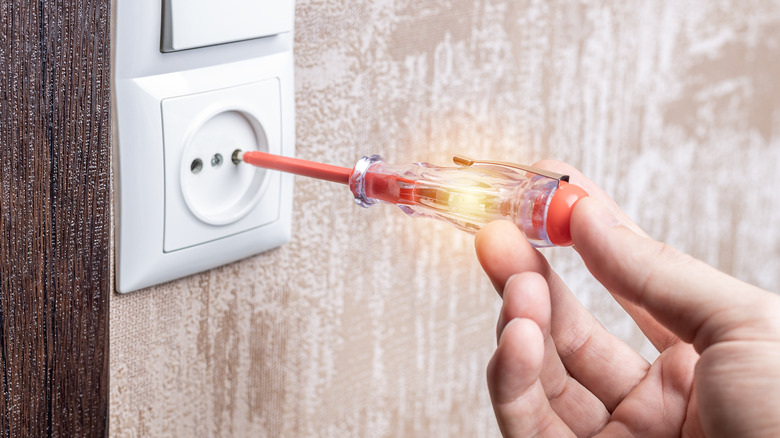Warning Signs That Precede An Electrical Fire
Unlike other types of fires, ones that are electrical in nature typically occur without warning and can spread quickly along wiring within the walls of a building. Sometimes the cause is old wiring, but other common problems include improper electric installation and overloaded circuits. Dousing an electrical fire with water is immensely dangerous, explains FireRescue1, making an electrical fire even more complicated to deal with. But if we are paying attention, there are often subtle clues that something is wrong long before the fire actually happens. And, because these indicators tend to be intermittent or mild, they can often be dismissed until it's too late.
According to Avvo, unawareness of a home's electrical limits often leads to fires that could have been avoided. For example, the prolonged and excessive use of extension cords and power strips are among the most common reasons for house fires that could have been prevented. Overcrowding an outlet, scorch marks on a wall or outlet, or sparks that fly when you plug something in clearly point to electrical problems, but there are several other, often ignored, signs to look out for.
The circuit breaker trips
A circuit breaker is designed to keep your home safe. When too much current is flowing through a circuit breaker, it will trip. Alure Home Improvements says that an occasionally popped circuit is usually nothing to be concerned about, but if your breakers trip often, it likely means there's a serious problem that warrants investigation.
An overload typically occurs when too many things are plugged into the outlets connected to a single circuit, which is common with powerstrip usage. It can also happen when an appliance takes a bigger draw of electricity than expected. For example, if a circuit blows when the vacuum cleaner or toaster oven is in use, then this is probably just a temporary overload. If it happens repeatedly, however, then you may need an electrician to upgrade the circuit by increasing the amperage.
Other reasons for breakers to trip include circuit shorting, which is when certain electrical wires running to or from the circuit box are too close or touching. A ground fault problem is similar, explains Allure Home Improvements, but instead of a wire touching another wire, it's touching the metal outlet box. Alternatively, the reason for a circuit breaker to trip could be a faulty device, so, it's wise to pay close attention to which appliance is running when the breaker pops.
Smell of melting plastic or a strange fishy odor
The components that make up an electrical system include plastics and heat-resistant chemicals that give off strange odors when overheating occurs, explains Simon Martin Associates. The odor tends to be intermittent and has been described as smelling fishy or like ammonia. It might be tempting to dismiss this sign since it comes and goes, but these smells are often early warnings of a problem in the system that could lead to a fire.
Sometimes it can be difficult to track down the primary location of the odor. Simon Martin Associates lists a number of electrical problems that can give off these distinctive smells, including frayed or damaged electrical insulation, loose plugs, arcing sockets, undersized wiring or circuits, and overloaded or short circuits. If you are concerned about the source of any strange smells, it is recommended to call an electrician who will investigate thoroughly to find the source of the problem.
Lights flicker all the time
Bates Electric says that flickering lights often have a simple explanation that doesn't necessitate a call to an electrician. Ask yourself these questions before making a phone call... Is the flickering happening in a single lamp or in the wired-in overhead light? What kind of bulb am I using? Is the bulb loose? Is the plug fitting into the outlet properly? Is the light designed to use a dimmer switch and, if so, am I using a compliant bulb? Any one of these reasons can cause flickering. You'll also want to determine how often the problem is occurring.
Once you've ruled out any possible culprits, Bates Electric says the issue could be with fluctuating current, an overloaded circuit, old wiring, or wires that are loose. There may also be an issue with your connection from the utility service or your circuit box. These are the types of issues that need the professional help of an electrician.
Crackling or popping noises
Crackling, sizzling, or popping noises coming from an outlet or circuit box should be checked out by an electrician. According to Homestead and Prepper, these noises are usually related to improper installation, faulty hardware, or moisture. Any of these can lead to arcing or sparking and result in a fire.
Outside of the potential for starting fires, AC Electric warns that arcing is extremely dangerous and can cause physical harm. The popping sound can be caused by the electricity moving through the air from the damaged wire to another striking point. The arc flash produced by this type of electrical discharge can cause serious burns, cardiac arrest, and nerve damage. Injury can happen from as far as 10 feet away from the origination point of the arc.
However, it's more likely that you will experience the common problem of flashing occurring from an outlet, says AC Electric. This is often caused by old, worn-out electrical sockets, sloppy repairs, or moisture in the outlet. All of these can lead to noises coming from the area of the socket and should be investigated by a professional.
Heat or vibration on a wall near an outlet
As a general rule, electrical outlets should not feel warm or hot and they shouldn't vibrate or hum, but it's a common problem that occurs in older homes as the wiring wears out, says Prairie Electric. The right combination of issues can create this problem in any age of home, though, so if you hear or feel buzzing coming from a wall or outlet and it's warm to the touch, it's best to call a licensed electrician as soon as possible.
Some things that can cause an outlet to get hot or buzz include reversed polarity, loose wires, or an issue with a breaker in the circuit box. According to Waypoint Property Inspection LLC, reversed polarity means it was wired backward, which completes the circuit but not safely. To test for this problem, use a multimeter or outlet tester, available for under $20 from any big box store or online.
